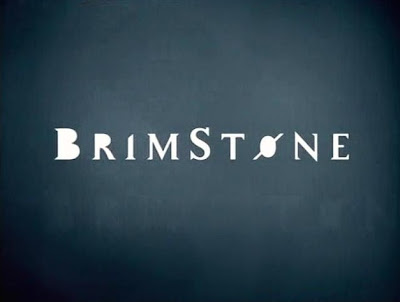The fourth episode of Brimstone (1998 – 1999), “Encore” continues the pattern set down by the third episode, “Heat.”
In specific terms, that means the Hell-escapee of the week isn’t merely a diabolical fugitive to be apprehended and sent back to Hell, but a deliberate reflection of Detective Ezekiel Stone’s (Peter Horton) personality and situation.
In specific terms, that means the Hell-escapee of the week isn’t merely a diabolical fugitive to be apprehended and sent back to Hell, but a deliberate reflection of Detective Ezekiel Stone’s (Peter Horton) personality and situation.
In this case, the villain of the week is Gilbert Jax (William McNamara), the man who raped Stone’s wife, Rosalyn (Stacy Haiduk) in 1983 and by doing so destroyed the Stone marriage. Stone murdered Jax, and that’s the reason Stone was consigned to Hell. Now, Jax is back on Earth, and living with his mother, Evelyn McNabb (Louise Fletcher). She believes her son has been in Heaven with the angels and is getting a second chance at life on Earth.
 While Stone hunts Jax down, he relives the day of Rosalyn’s rape (via flashback), and compares his own feelings of powerlessness and rage to those of another rape victim’s husband. That man gets “angrier and angrier” every day, and Stone counsels him to calm down, lest he take the same path that Stone took; the path that led the detective to Hell.
While Stone hunts Jax down, he relives the day of Rosalyn’s rape (via flashback), and compares his own feelings of powerlessness and rage to those of another rape victim’s husband. That man gets “angrier and angrier” every day, and Stone counsels him to calm down, lest he take the same path that Stone took; the path that led the detective to Hell.In the end, Stone dispatches Jax with some difficulty (arranged by the Devil [John Glover]) and there’s a terrific final scene that helps to explain succinctly why Brimstoneis such a great series. Jax disappears, and his mother, Evelyn, sits down heavily, realizing that her son is gone…for good this time. Then, she asks if Stone is an angel and if Gilbert has been “sent back to Heaven” where she feels he “belongs.”
 Instead of arguing with Evelyn about the merits of her (terrible...) boy, Stone is quiet…and lets her keep her delusion. He doesn’t tell her the truth that Gilbert is back in Hell, and Damnation is where he actually belongs.
Instead of arguing with Evelyn about the merits of her (terrible...) boy, Stone is quiet…and lets her keep her delusion. He doesn’t tell her the truth that Gilbert is back in Hell, and Damnation is where he actually belongs. This small moment reveals that even in a situation where Stone has been grievously wronged and feels absolute rage, he realizes he can still be decent to someone else who is hurting. There is nothing to gain by shattering Evelyn’s image of her wayward child. So instead of laying more hurt at her feet, Stone holds his words, and it’s a powerful and moral act. It’s a great moment for the episode, and for the series.
 “Encore” also looks long and hard at Stone’s behavior in other ways: his murder of Gilbert back in 1983, for example. The Devil accuses him of “denial, pride, and self-righteousness,” and those are feelings all of us might have in a similar situation. Stone lost everything because of what Jax did, but also because of how he, personally, responded to what Jax did.
“Encore” also looks long and hard at Stone’s behavior in other ways: his murder of Gilbert back in 1983, for example. The Devil accuses him of “denial, pride, and self-righteousness,” and those are feelings all of us might have in a similar situation. Stone lost everything because of what Jax did, but also because of how he, personally, responded to what Jax did.Stone knows too well that to indulge those feelings of denial, pride and self-righteousness with action (and murderous action to boot) is to indulge his dark side, especially since he abuses his position as a police officer.
Again and again, Brimstone charts this fascinating trajectory. Stone is a man stuck in a universe of absolutes: Heaven/Hell, God/Devil, Good/Bad. Yet everything he experiences on his journey is a reminder that life isn’t that simple or black-and-white.
He keeps finding shades of gray in the human experience, and trying to countenance what they mean. The show thus asks questions about the differences between vengeance and justice, and suggests that even “monsters” like Jax are loved by their mothers, and that such love can be respected.
He keeps finding shades of gray in the human experience, and trying to countenance what they mean. The show thus asks questions about the differences between vengeance and justice, and suggests that even “monsters” like Jax are loved by their mothers, and that such love can be respected.
It’s a very, very challenging dynamic, and it’s absolutely part of what made Brimstone must-see TV. I loved that on Friday nights in 1998-1998 -- between Brimstone and Millennium, -- viewers got a double dose of the horror genre at its best, a genre that can ask and answer the big questions of humanity in a meaningful way without seeming preachy.












No comments:
Post a Comment